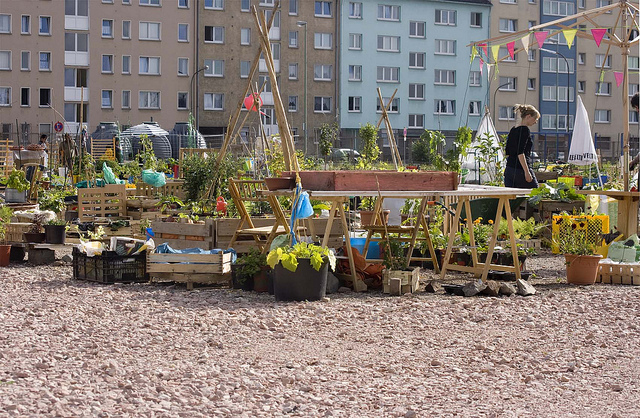Rethinking our relationship with technology means rethinking our relationship with the environment, with the people that surround us, with the planet.Just when we have finally decided to wake up to reality – according to the scientific community, we only have eleven years left to alleviate the impact of climate change and millions of students across the world are demanding that governments declare a climate emergency – it seems contradictory to want to lay the foundations for a calm and collected debate. However, that does not make it any less necessary. Because yes, as Greta Thunberg says, the house is on fire and we should start to panic, but not everything helps to put out the fire. And, above all, we need a systemic approach, one that dares to address the issue on a planetary scale; otherwise, we will be falling back on colonial patterns in a postcolonial world. We are all in agreement that we do not want more open-pit mines in Europe. But does this mean that to satisfy our industrial needs we have to import minerals from China or the Democratic Republic of the Congo? What if a country’s greenhouse gas emissions were measured not only by what their industrial sector emits, but also by factoring in those associated with their consumer goods? Rethinking our relationship with technology means rethinking our relationship with the environment, with the people that surround us, with the planet. There are areas in which technological optimism is justified, of course; this isn’t about undermining developments in new renewable energy sources or energy efficiency, for example, but there also shouldn’t be blind faith in technology as the solution to all the eco-social problems we are facing. The digitalisation of the economy cannot be used as an excuse not to continue the shift towards a care-oriented environmentalist and feminist society; we also mustn’t forget that, as in all political or economic action, the process of digitalisation can be implemented fairly or unfairly. This is why we must demand accountability, a public debate in which technological developments are subject to democratic scrutiny and can be challenged. For one thing, is it physically possible for all of earth’s inhabitants to have a smartphone or a personal computer? The fact that the technological revolution always seeks to associate itself with ethereal concepts such as the Cloud isn’t trivial. The reality is in fact very different: technological development increases our dependence on minerals that are scarce, finite and located at very specific points on earth. At the same time, the parts that make up technological equipment are getting smaller and smaller, and they contain such miniscule amounts of certain metals that it’s impossible to reuse or recycle them. Technological progress is made at the cost of turning certain parts of the planet first into mines, then landfills. What’s more, the industry has made a huge effort to cover up the truth about the speed of telecommunications: the vast infrastructures required to store information, and the CO2 emissions associated with things like storing emails in our inbox. We think of the internet as something that connects us without cables, but the reality is that the information is stored on immense servers and there is an increasing number of cables in the depths of our oceans. The practical impossibility of advancing the technological revolution ad infinitum is the agenda around which all other considerations relating to the challenges and opportunities posed by the Fourth Industrial Revolution are based.
The digitalisation of the economy cannot be used as an excuse not to continue the shift towards a care-oriented environmentalist and feminist society.Considering the trends caused by the robotisation of the labour market thus far, it’s clear that there is less and less need for a medium-skilled workforce, which is leading to greater polarisation and inequality. If we lose sight of the idea of social justice as the cornerstone of our economies, digitalisation leads to instability of employment, uncertainty and the breakdown of the patterns on which our social security systems are currently based. This is something we’re already seeing with platform work, with the so-called Uberisation of the economy blurring the margins of workers’ rights; technological advances are being used to create a false self-employed workforce whose income is not enough to keep them above the poverty line. Therefore, digitalisation and robotisation would appear to be more than sufficient as arguments for questioning whether the social contract that was signed upon establishing the Welfare State after the Second World War remains unchanged. And, given the threats to the sustainability of the pension system, for example, we cannot expect to respond with the mantra of full employment. Rather, it seems clear that we need a new arrangement of working time or revenue model. If we want to guarantee social justice at a time in which full employment appears to be unattainable, we must put a stop to associating full employment with social rights. Thought must be given to possible solutions, ranging from the collective reduction of working time to universal basic income, which, of course, will need to be financed by something other than employment income. Failing to implement these solutions means turning our backs on those most vulnerable to technological progress. Technological progress will call everything into question, from who we are as individuals to the limits of human nature, to what we eat or how we participate in democracy. And while it’s true that the introduction of the Internet of Things, the arrival of the smartphone and constant hyperconnectivity are leading to increased isolation, could not technology – through the simplification of processes – be used as a way of gaining more free time? What if we used the time afforded to us by increased productivity for leisure and collective debate? There are examples in cities such as Seoul, San Francisco, Barcelona, Madrid and Grenoble of how computer tools are making public administration processes more participatory, with a commitment to transparency and freedom of information. In order to do this, it is essential to put a stop to the impulses of the industry, as in the case of San Francisco, which has become the first city to ban the use of facial recognition technology on its citizens. It is therefore about using technology to strengthen our citizen’s rights and the values that were ushered in with the Enlightenment, such as the presumption of innocence – and not the other way around.
What is relevant right now is guaranteeing that technological developments occur in a way that is both inclusive and compatible with the limitations of the planetIt’s not a case of anything goes in technological development, and sometimes this is obvious: there is a consensus when it comes to the prohibition of killer robots. But sometimes it’s trickier to define the boundaries. If precision-guided munitions are able to isolate their targets with near precision, does this mean that from now on we’re going to recognise foreign military interventions as justified? Can we justify drone attacks on the leaders of terrorist organisations? In other words, are we ready to renounce our pacifist values in favour of security? I sincerely believe that the answer is no. The greatest challenges of the twenty-first century can only be addressed from a place of respect, understanding and the advancement of Human Rights. Whatever your generation. This is why we don’t just need more people qualified in engineering or sciences to advance research and technological development. We also need more philosophers, experts in law and political theorists who are capable of seeing beyond the mathematical perfection of an algorithm, of introducing ethical variables in the development of autonomous vehicles, of anticipating potential violations of fundamental rights and of considering the right of local communities to decide on their own domains. The truth is that it no longer matters whether or not the technological revolution is desirable. It’s happening. It’s already part of our lives. What is relevant right now is guaranteeing that technological developments occur in a way that is both inclusive and compatible with the limitations of the planet, so that we can finally leave behind the idea of progress coupled with evolution, and bring the focus of the discussion to our ability to live well. This post is republished from the Green European Journal. Read the original article here.

Green growth advocates praise resource efficiency for its potential to incentivize the economy and lower its ecological impact. On the other hand, the Jevons Paradox, describes multiple situations (or rebound effects) in which increased efficiency leads to further consumption (either direct or indirect) which offsets the initial ecological benefits achieved. In this piece, I join this discussio...

Degrowth is usually translated into German as "Postwachstum" (post growth) or "Wachstumsrücknahme" (reversing growth), but it can also be translated as “ausgewachsen” (grown up). This captures two aspects: on the one hand the end of growth and on the other hand the entry into a stage of maturity, namely adulthood. Adults are expected to show increased maturity and responsibility for themselves ...

On the Need for Collaboration Between Social Movements and Activisms Not that long ago, I left North America and arrived fresh and starry-eyed in Lund, Sweden, ready to begin my master’s degree in a program entitled Culture, Power and Sustainability. In my second year, I decided to write my thesis about the Transition Town movement, a social movement out of Great Britain born of the need to ac...